The speech by the parents of Hersh Goldberg-Polin touched delegates at the Democratic convention in Chicago on August 21. When they took the floor, their 23-year-old son, kidnapped by Hamas, was still alive. His body was found over the weekend by the Israeli army in a tunnel under the town of Rafah. Along with five other hostages, he had been shot at point-blank range by Hamas fighters, according to the Israeli health minister.
Because of the public role played by his parents, Jon and Rachel, in mobilizing support for the hostages, and their many contacts with American officials, the emotions aroused in Washington were intense. The family’s personal grief has been compounded by the feeling that time is running out to save the prisoners who are still alive.
Yet American officials refuse to address the current impasse, as does a section of Israeli society, wound up against its own government. Shortly before midnight on Saturday, August 31, Joe Biden and then Kamala Harris each issued a statement. The president said he was “devastated and outraged,” and “heartbroken,” adding that “Hamas leaders will pay for these crimes,” referring to Yahya Sinwar, its leader, who is currently nowhere to be found.
For her part, the vice president declared that this “evil terrorist organization” must be “eliminated” and that “Hamas cannot control Gaza.” These formulaic phrases, borrowed from the jargon of the Israeli right over the last 11 months, do not correspond to the operational analyses of the army itself, which has no desire to linger in the ruined Palestinian territory.
Out of step with reality
In recent months, the Democratic candidate has been more empathetic than Biden towards the tortured civilians of Gaza. But, with two months to go before the presidential election, she does not want to expose herself to the accusation that she is turning her back on Israel, despite the mobilization and criticism of a section of young Democrats in several key states, such as Wisconsin and Michigan.
On Saturday, the vice president made no explicit reference to the administration’s long-standing diplomatic efforts to bring about a ceasefire. This would secure the release of the hostages in exchange for an Israeli military withdrawal and the release of several hundred Palestinian detainees. In mid-August, Biden had said he was “optimistic” about the imminent conclusion of negotiations.
His entourage even mentioned a date, the end of the week of August 19, during which the Democratic convention in Chicago was held. Such remarks had already been made in previous months, without consequence, leading to a devaluation of American credibility. On Monday, Biden was due to convene his team of negotiators at the White House, with a view to formulating a final offer in the next few days.
You have 44.26% of this article left to read. The rest is for subscribers only.

